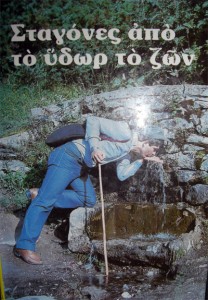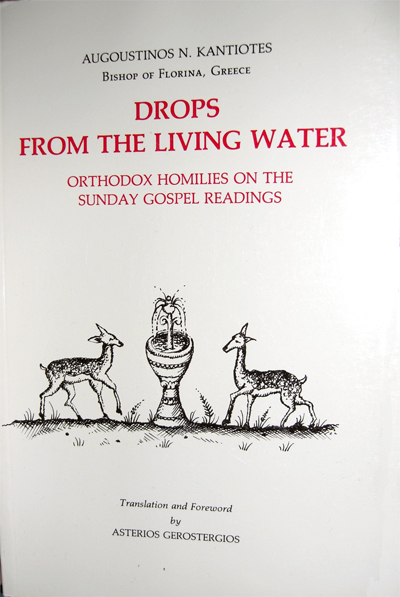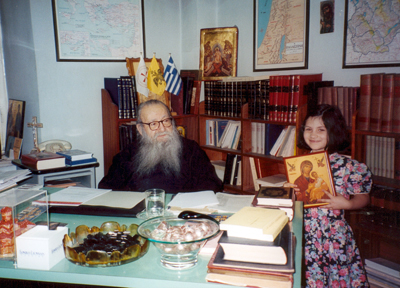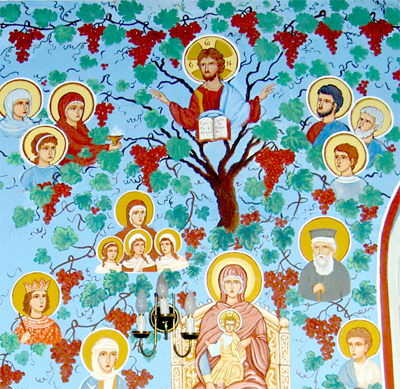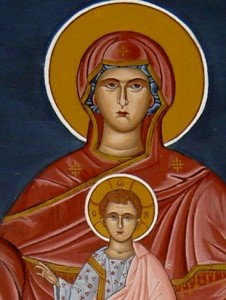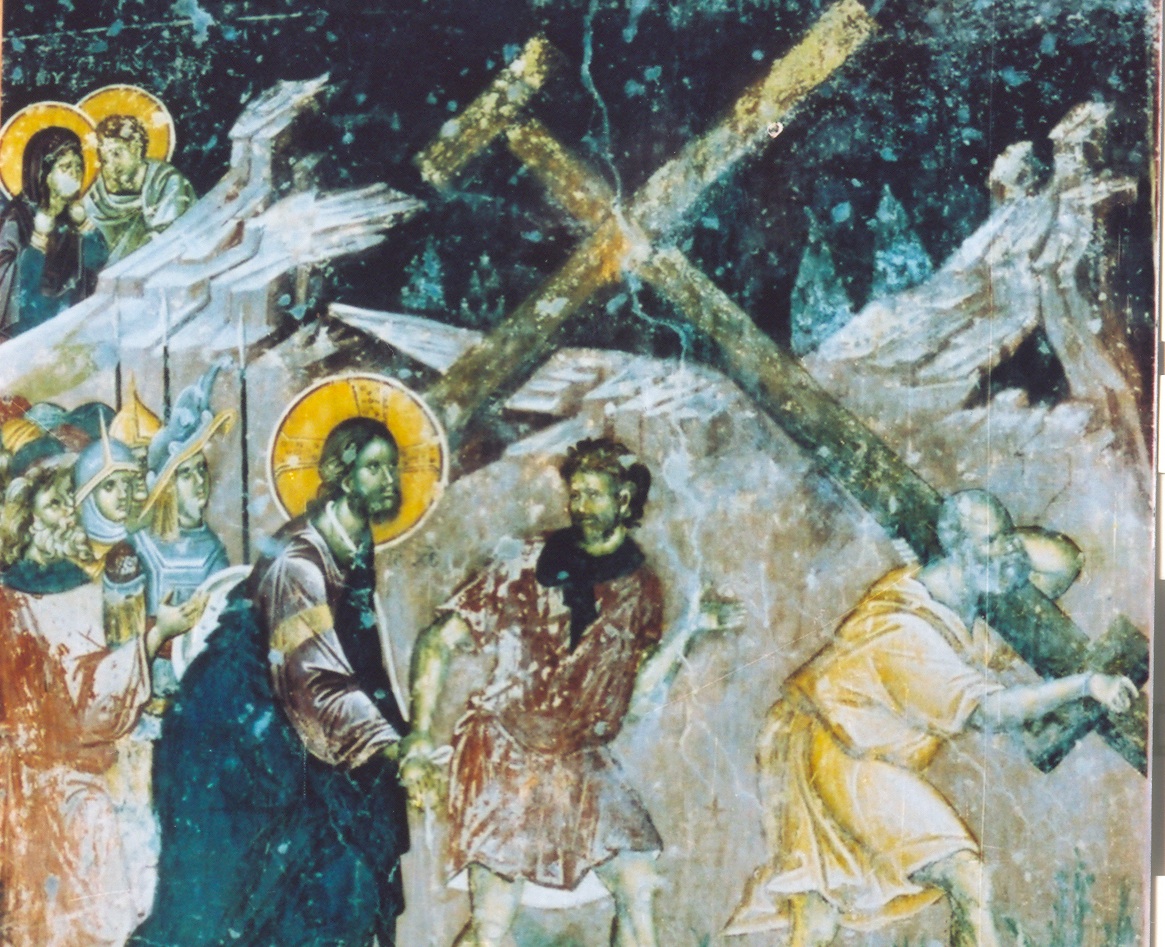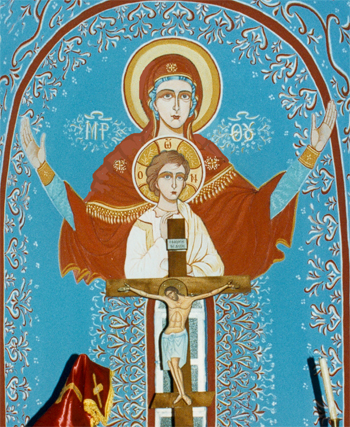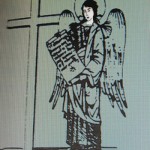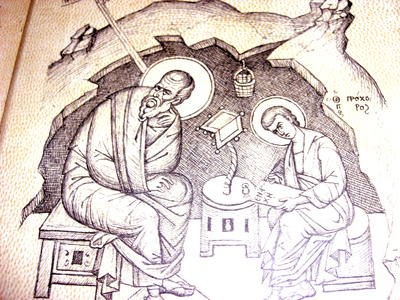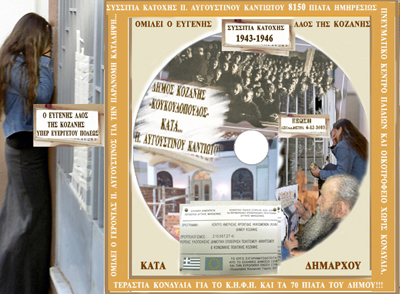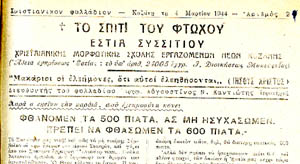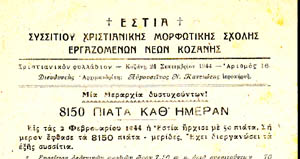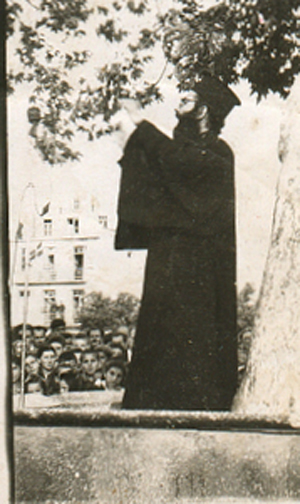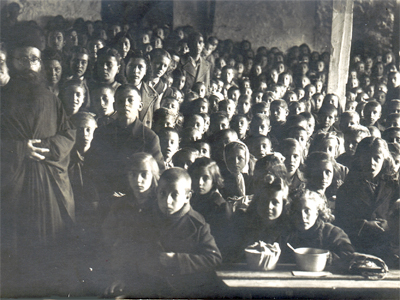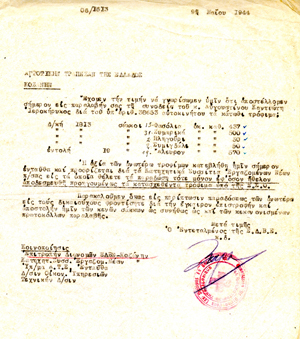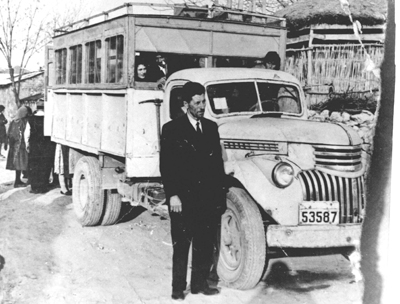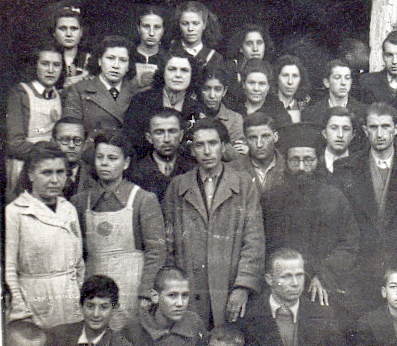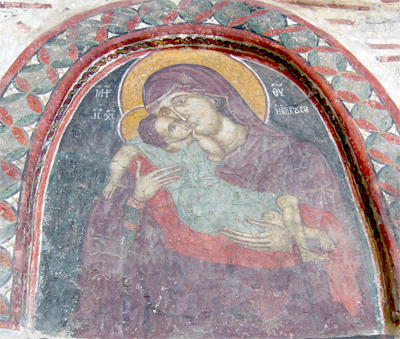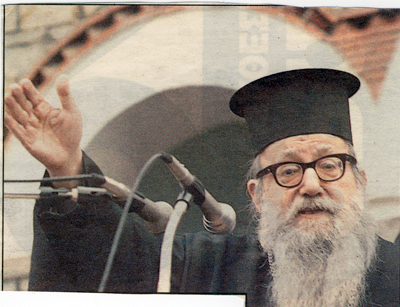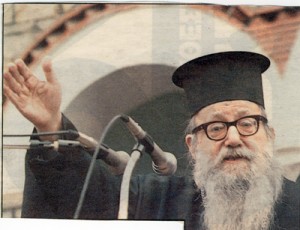ARE YOU PROCLAIMING (CONFESSING) YOUR FAITH?
 Posted by: Επίσκοπος Αυγουστίνος Καντιώτης on
Posted by: Επίσκοπος Αυγουστίνος Καντιώτης on  Μαρ 24th, 2009 |
Μαρ 24th, 2009 |  Filed under: English
Filed under: English
THE THIRD SUNDAY OF LENT
(THE VENERATION OF THE HOLY CROSS)
HEBREWS 4:14-16; 5:1-6)
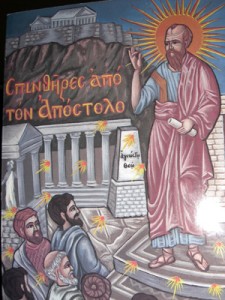 ARE YOU PROCLAIMING
ARE YOU PROCLAIMING
(CONFESSING) YOUR FAITH?
Τμήμα από το βιβλίο του πατρός Αυγουστίνου «ΣΠΙΝΘΗΡΕΣ ΑΠΟ ΤΟΝ ΑΠΟΣΤΟΛΟ»! Κήρυγμα του π. Αυγουστίνου για την Γ΄ Κυριακή των Νηστείων, την Κυριακής Σταυροπροσκυνήσεως με βάση το Αποστολικό ανάγνωσμα, μεταφρασμένο στα Αγγλικά. Η μετάφραση στα Αγγλικά έγινε από τον ακούραστο εργάτη και αγωνιστή της Ορθοδοξίας, πνευματικόν τέκνον του π. Αυγουστίνου, πατέρα Αστέριο Γεροστέργιο. Προσφέρεται ταπεινά και με την εν Χριστώ αγάπη εις ψυχικήν ωφέλειαν Ορθοδόξων Χριστιανών απνανταχού της γης και επισκεπτών της ιστοσελίδας του σεβαστού Γέροντος Αυγουστίνου προς δόξαν του Τριαδικού μας Θεού.
Brothers, let us hold fast our profession.
-Heb.4:14 King James
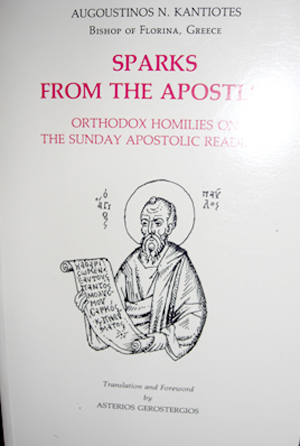 Today, beloved, on the third Sunday of Lent, the Epistle reading is an excerpt from a letter to the Hebrews, written by the Apostle Paul for Hebrews who believed in Christ. They were few compared to the rest of the Hebrews who, in spite of all the miracles that took place both before and after the Resurrection, refused to believe in Him. These unbelieving Hebrews became furious when they heard that some of their compatriots believed in Christ. They used every means, even the most criminal, to force them to return to Judaism. They beat them, jailed them, tormented them, took away their properties, and set fires to their homes. The Christian Hebrews who were prosecuted by their countrymen were hungry, naked, and homeless. They needed consolation and support so as not to give up and deny their faith.
Today, beloved, on the third Sunday of Lent, the Epistle reading is an excerpt from a letter to the Hebrews, written by the Apostle Paul for Hebrews who believed in Christ. They were few compared to the rest of the Hebrews who, in spite of all the miracles that took place both before and after the Resurrection, refused to believe in Him. These unbelieving Hebrews became furious when they heard that some of their compatriots believed in Christ. They used every means, even the most criminal, to force them to return to Judaism. They beat them, jailed them, tormented them, took away their properties, and set fires to their homes. The Christian Hebrews who were prosecuted by their countrymen were hungry, naked, and homeless. They needed consolation and support so as not to give up and deny their faith.
Now, who else more suitable to console and support these Christians than the Apostle Paul? Paul, formerly a fanatic Hebrew who had persecuted his Christian countrymen with a passion, had changed fundamentally. Paul came to believe in Christ, was baptized, and became Christ’s most ardent preacher. He who previously blasphemed Christ, now preached the word of God with courage and great power and professed Christ everywhere. He understood very well what these believing Hebrews were enduring. He understood their sufferings. He understood the ideological war that was being waged against them to shake their faith. With passages taken from Holy Scripture, which the enemies of Christ interpreted any way they pleased, with lies and with forgeries, the unbelievers attempted to prove that Christ was not the Messiah for Whom the Hebrew nation had awaited for centuries. For these reasons, Paul wrote his famous letter to his suffering Christian compatriots. Paul was being consoling and supportive. He proved that Christ is above the patriarchs, prophets, angels and archangels. Christ is the Word of God, the Messiah, the redeemer of the entire world, the true God. Paul’s arguments, taken from Holy Scripture, are indisputable. He rebuked unbelievers and told those who were not shaken in their faith by the attacks of the enemies to take courage and strength. Paul’s Epistle to the Hebrews is a powerful weapon against all unbelievers of all times. At the same time it is a warm invitation to all Hebrews and all unbelievers to abandon their unbelief and believe in Christ.
In this Epistle, after proving that Christ is the true God, the Apostle Paul addresses everyone, saying: Brothers, let us hold fast our profession”, that is, let us hold fast to our faith in Christ, and let us preach it and confess it everywhere without reservation, without doubt, and without fear. We must be unshaken and brave as we profess our faith.
“Brothers, let us hold fast our profession.” The faithful not only of that age but also of the following years when the Christian faith was persecuted, heard and practiced this counsel that was inspired by God. Whoever read the martyrologies cannot help but stand in admiration before the heroes of the faith. They had only to say three words to the tyrants – “We deny Christ” – to be spared the torments, to be freed from the prisons, and to be allowed to return to their homes. But they didn’t say these words. To the question of the tortures, “What are you?” they answered, “We are Christians”. The martyrs professed their faith before thousands of people who shouted, “Death to the Christians”. It was very moving to hear not only men but also women and even small children say, “We believe in Christ. Do to us whatever you wish. We won’t deny our faith”.
The history of our nation reveals that during the Greek Revolution of 1821, when Turks conquered the island of Chios, they brought the women and children to the seashore (the men had been killed in the fighting), put a Crucifix on the ground and told them: “Whoever spits on it will be saved; those who don’t will be killed”. The Turks gave them some time to decide. But no one, not a woman or child, spit on the Crucifix. They all shouted: “We believe in Christ. Praise be to Christ, praise be to the All-Holy Mother, praise be to All the Saints”. In this way, professing their faith, these new martyrs sacrificed their lives.
“Brothers, let us hold fast to our profession”. If from those heroic times of Christianity we look at our present day, will we meet the heroic spirit of the martyrs of our faith? The kind of danger that existed when the unbelievers put knives to the necks of the Christians, saying to every on of them, “Either you deny your faith or you will be killed”, does not exist in our country today. Unbelievers don’t put the knife to the necks of the faithful, but they wage war in another way: they scoff at the faithful. And the so-called faithful are so timid that they cower at the scoffings, as if the unbelievers were ready to kill them. Alas! The martyrs weren’t afraid of the knives, the flames, or the other forms of torture. Today, Christians are afraid of a mocking smile, a scornful word, a frown; they tremble lest they be characterized as old-fashioned; they silence their voices and refrain from making the sign of the Cross in public, hiding like little children playing hide-and-seek. They don’t profess their faith.
Because the so-called faithful don’t profess their faith, the unbelievers and impious, observing this lack of response from the Christian people and receiving no rebukes or chastisement for their scoffing, become bold and shameless, mocking the Orthodox faith and blaspheming the clergy. Wherever they may be, the unbelievers of today try to spread the lies of atheism. Where is Paul to profess the faith and rebuke the impious and faithless?
Where is Paul? You, beloved, must become Paul. We’re not saying that you can measure up to Paul. No. But you can imitate Paul and the other Apostles and martyrs, and you can preach Christ within the small circle you live in. Don’t be afraid. Even if all those around you are scornful, sarcastic, and jeer at your faith, even if they try with a thousand and one satanic means to shake you and pull you away from Christ, you must not lose your courage. Remain steadfast and unafraid like a rock that’s unmovable, even though it is assaulted on all sides by the waves of the ocean. Your faith in Christ must be as solid as a rock, the Orthodox faith. With words, with deeds, and with your Christian life, you must profess in this unbelieving and atheistic world that your faith in Christ is the only true faith. Only then will you become like Paul, a martyr and confessor of Christ. Then your will be among those whom the Apostle today exhorts: “Brethren, let us hold fast our profession”.
Translated in English from its original in Greek by
+Reverend Father Asterios Gerostergios
Saints Constantine and Helen
Greek Orthodox Church
Cambridge, Massachusetts – U.S.A.
The chapter was taken from the book “Sparks from the Apostle”, written by Bishop Augoustinos Kantiotes – Florina, Greece. The book contains sermons based on the Sunday Apostolic Readings. The distinguished preacher and writer addresses with his homilies the anxieties and the needs of our times. In an Orthodox manner, he discusses the spiritual, ethical, and social problems that beset contemporary man. With his homilies, which are based on the preaching of the Apostles and the Bible in general, he tries to strengthen the people of God in their Christian life. Bishop Augoustinos’ message is convincing. It is delivered in a lively, well written, yet simple and comprehensible way, using both Biblical and contemporary examples. He brings the Apostolic Reading to life, and in his own unrivaled fashion, he transports the reader back to those early heroic days of the Apostles.
The Bishop speaks with pious enthusiasm, from a heart full of faith and fervor. He strikes sensitive chords of the heart, creating a spiritual atmosphere in which the Word of God embeds itself firmly. At the same time, he demonstrates that the message of the Holy Bible is a great and unique gift from heaven to earth, from God to man.
The present book, Sparks from the Apostles, is addressed to all who are interested in the pure Orthodox teaching of the Holy Writ. It is offered especially to students and preachers of God’s Word, clergy and laity alike, to strengthen them in their work of preaching and catechism.
INSTITUTE FOR BYZANTINE AND
MODERN GREEK STUDIES
115 Gilbert Road
Belmont, MA 02478-2200
Tel. 6174848584
Fax.6178763600
e-mail: ibmgs3@verizon.net
www.orthodoxinfo.com/ibmgs/
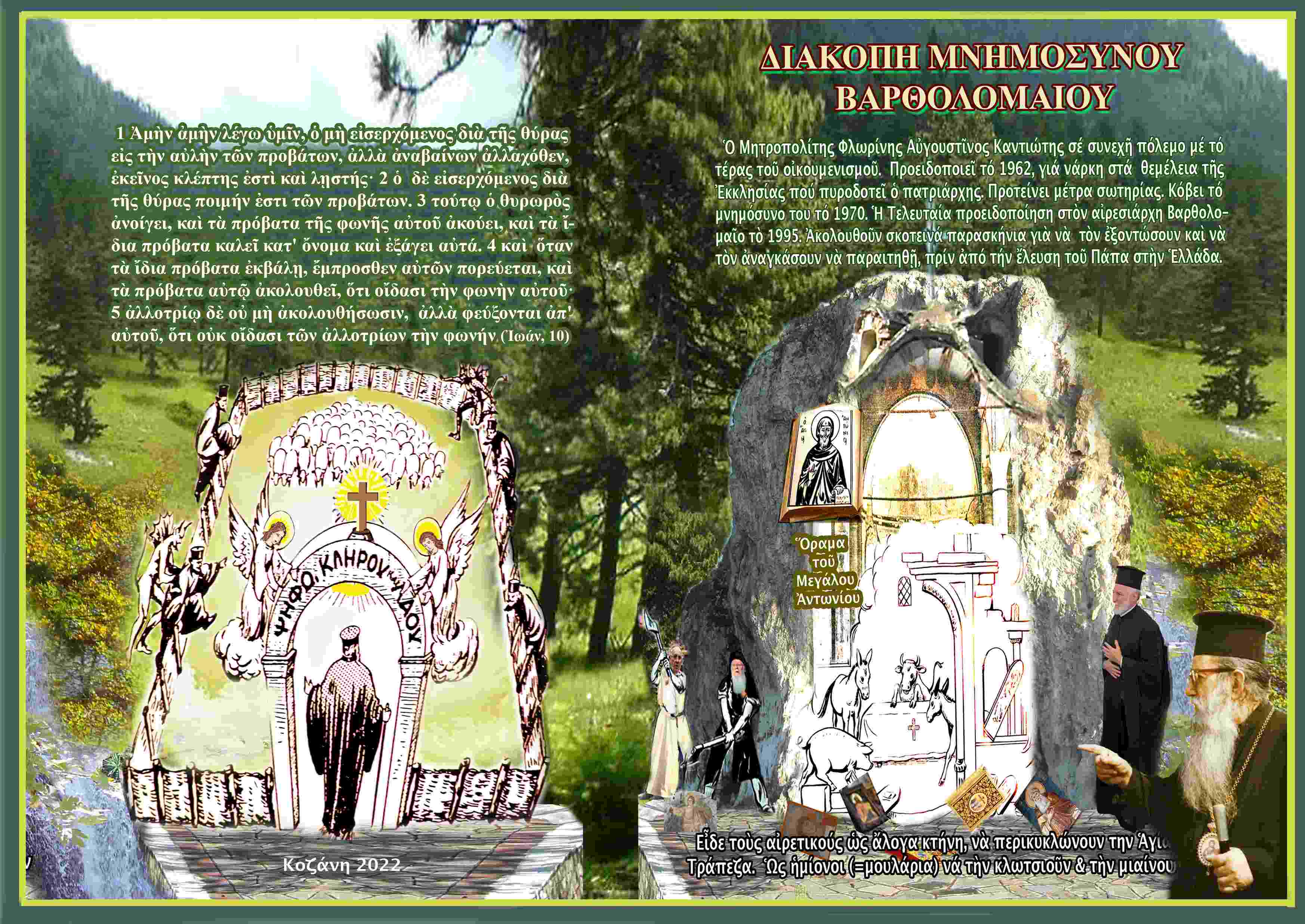
 Be the first!
Be the first! 
